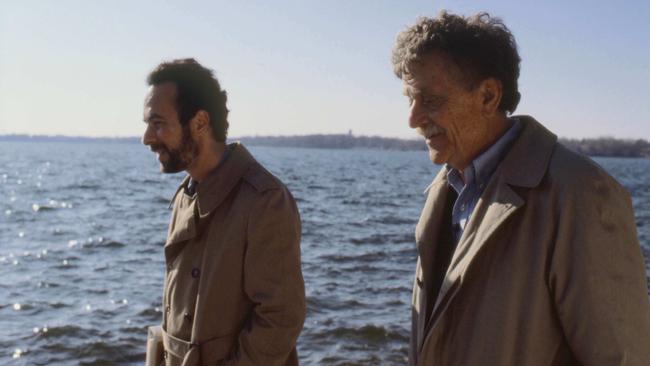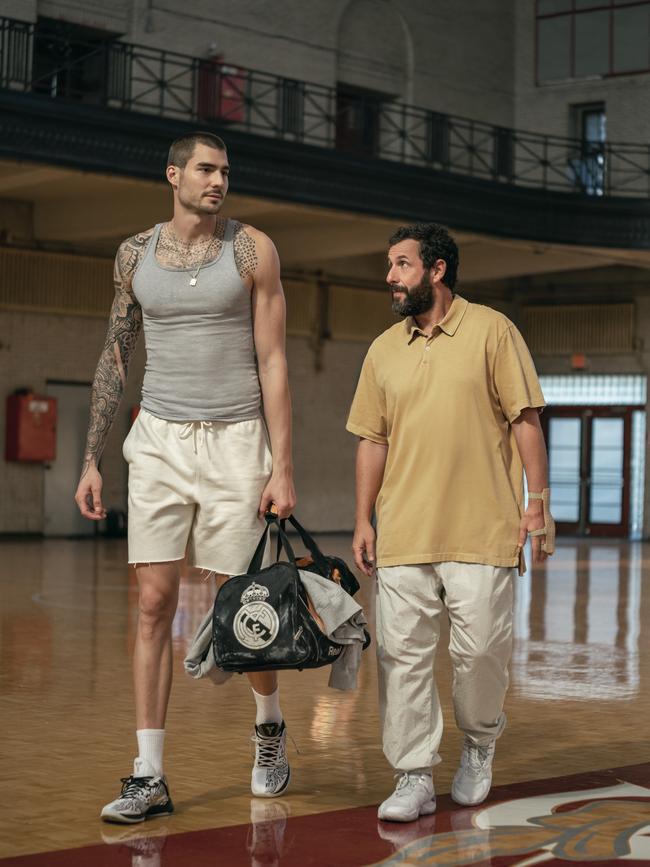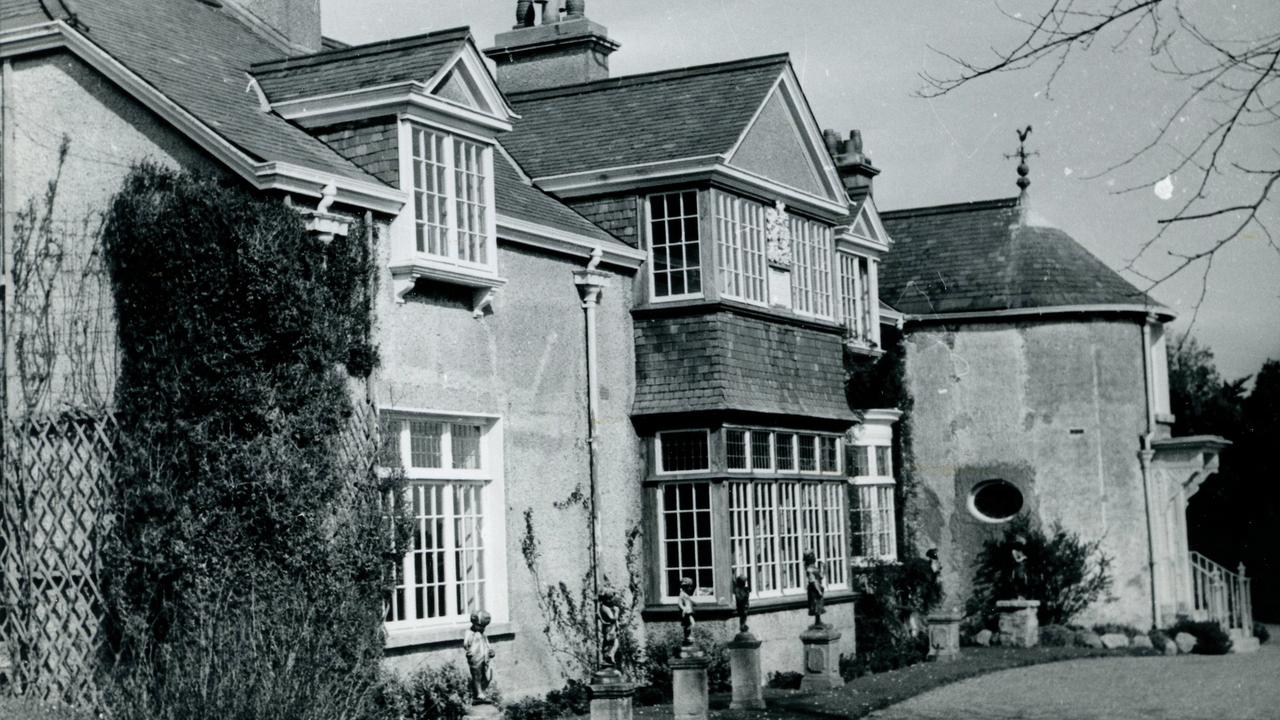Kurt Vonnegut: Unstuck in Time, the author warts and all
The fame of Slaughterhouse-Five propelled the author into Manhattan and the literary elite. He left his wife, the woman who believed in his writing when he did not.

Kurt Vonnegut: Unstuck in Time (M)
In cinemas from July 7
★★★★
The title of Kurt Vonnegut: Unstuck in Time comes from the American author’s breakthrough novel, Slaughterhouse-Five: “Listen: Billy Pilgrim has come unstuck in time.”
If there is an intimation of time travel in Vonnegut’s life, the before and after point is that 1969 novel, published a quarter of a century after he, a prisoner-of-war, survived the Allied firebombing of Dresden.
He was in an underground meat locker. When the bombing stopped, he and other POWs were forced to retrieve bodies – men, women, children, babies – from the smouldering ruins. The archival footage from Dresden, used in this film, is confronting.
It took Vonnegut a long time to work out how to tell this story. The discussion of his numerous drafts – including one as a play rather than a novel – should be watched by any wannabe writer. It’s a fascinating reminder that writing a book is hard work.
Vonnegut (1922-2007) had published five previous novels, starting with Player Piano in 1952. They were well-received but not commercial hits. Slaughterhouse-Five was, as his daughter Nanette puts it, “the ka-boom moment”. His other daughter, Edie, adds, “The sum of money coming in was a total shock”.
The semi-autobiographical novel put Vonnegut alongside Philip Roth (Portnoy’s Complaint) and Mario Puzo (The Godfather) on The New York Times bestseller list.
It changed his life, for better and for worse. So it goes, as he repeats 100 times in the novel, making that phrase a mantra for the Vietnam War generation.
This documentary is written and directed by Robert B Weide, who, like many readers, including this one, was in high school when he fell in love with Vonnegut’s archly satirical, deeply humane writing.
“My books are a mosaic of jokes about serious matters,” Vonnegut says, adding he aims to write about “people who have tried to behave decently in an indecent society”.
When Weide was 23, with a documentary about the Marx Brothers under his belt, he wrote to Vonnegut, who was almost 60. To his surprise, Vonnegut, “the non-Salinger”, wrote back. The two met, became friends and a film project began. The fact we are seeing it only now explains why two directors are credited. Don Argott came in to film the filmmaker.
“When you take almost 40 years to make a film, you owe some sort of explanation,” Weide says in one of his interviews, which are a small but important part of the film.
The explanation is simple on one level: Weide had bills to pay. He made more documentaries on comedians, from WC Fields to Lenny Bruce, for which he received an Oscar nomination, to Woody Allen, and then he hit the jackpot with the Larry David television series Curb Your Enthusiasm.
It is more complicated on another level. He talks candidly about starting out thinking, film first, friendship second, and then realising it was vice-versa.
The result is the most informative and revealing account of a writer’s life I have seen since Ken Burns and Lynn Novick’s recent three-parter on Ernest Hemingway.
Weide filmed Vonnegut at his public and media appearances, had access to home videos of his childhood and interviewed his two daughters, one son, and four adopted sons.
They do not hold back. They loved this gangly “doofus of a dad” but he was a temperamental man. One of the sons sums it up. There were times, if the writing was not going well, when “everybody was scared of him”.
His daughter Nanette is intuitive about why her father did not talk about Dresden. Denial is the one-word explanation.
“I had no sense of who he was at all,’’ she says. Until, that is, she read the book “and then I was amazed that this man lived downstairs”.
Vonnegut is interviewed throughout and, as Nanette points out, he laughs at inappropriate moments, such as when looking at a honour board of classmates who died in World War II. “It’s how he copes.’’
Vonnegut went through losses closer to home: the suicide of his mother, the cancer death of his beloved sister Alice, the person he wrote every book for.
There are beautiful moments, such as when Vonnegut revisits his childhood home in Indianapolis and places his hand in the hand prints left by his parents and siblings (and himself) on the cement on the front porch.
“It doesn’t make me sad at all,’’ he says, “because it was such a happy time for the family.”
The fame of Slaughterhouse-Five propelled Vonnegut into Manhattan and the literary elite. He rubbed shoulders with Norman Mailer. He left his wife, the woman who believed in his writing when he did not. All of this is covered warts and all.
He continued to publish novels, none of which reached the heights of Slaughterhouse-Five. Some, such as Slapstick, were pilloried. Sometimes it’s hard not to blame Margaret Mitchell for writing one novel, Gone with the Wind, and calling it quits.
You don’t have to be a fan of Vonnegut to enjoy this 127-minute documentary. Indeed, there is not a lot of literary analysis. It’s more a story of what happens off the page.
To finish where we started, with time, his advice about the future was to be patient because it would come to you soon enough, like a loyal, loving dog. “And the dog of my future, lying at my feet, is snoring now.”
-
Hustle (M)
Netflix
★★★
Adam Sandler made his film debut in the 1989 comedy Going Overboard, in which he is a stand-up comedian on a cruise liner. His most successful box office role is also a comic one: as the voice of Dracula in the animated Hotel Transylvania franchise.
His movies make money but when it comes to awards he’s most listed on the Razzies for the worst in film. He scooped the pool in 2012 with Jack and Jill, which won worst everything.
Yet this perception of the American comedian as someone only comfortable with lowbrow laughs has started to shift as he turns to more dramatic roles.
Paul Thomas Anderson’s comedy-drama Punch-Drunk Love (2002) might be seen as a starting point. More recently, he is terrific as one of the children of an overbearing father (Dustin Hoffman) in The Meyerowitz Stories (2017) and as the gambling-over-his-head jeweller in Uncut Gems (2019).

In his new film, the sports drama Hustle, he is Stanley Sugerman, a talent scout for the Philadelphia 76ers, a team in the National Basketball Association.
He travels the world looking for new players, living in motels and surviving on fast food. “Being the guy who finds the guy matters in this business,’’ he tells himself.
His wife Teresa (an impressive Queen Latifah) and their teenage daughter Alex (Jordan Hull) support him because they know he is a 55-year-old man still pursuing a childhood dream.
Stanley himself laughs off this idea. “Guys in their 50s don’t have dreams. They have nightmares, and eczema.” But that doesn’t mean the dream isn’t true and worth fighting for.
The 76ers owner (a too-brief cameo by Robert Duvall) trusts Stanley and decides to appoint him assistant coach. However when the owner’s son (Ben Foster) takes the reins, he sends Stanley back on the road to find the “missing piece” for the team.
He finds that piece – and it is a tall one – in Spain in the form of a 22-year-old construction worker, Bo Cruz, who he sees crushing the opposition in a street game.
This 117-minute movie is directed by Jeremiah Zagar, his second feature after We the Animals (2018). The title Hustle has a few meanings, one of which is how young men like Bo can hustle a rival’s ball – and cash stake – in such pick-up games.
Sandler is persuasively low-key. “I’m sensitive, too,’’ he tells Bo, now in the US, after he is mocked on court. “I cried at the end of Titanic.”
But the actor who makes a splash, as basketballers call a difficult three-point shot, is Spanish (and NBA) basketballer Juancho Hernangomez as Bo.
He is the centre of the drama and his nuanced performance carries that weight. He is also the pivot for the wry comedy.
His attitude to hotel room service – “Nine dollar Pringles!” Stanley tells him more than once – is a highlight.
Bo has a young daughter, back in Mallorca, and a past he’d prefer the NBA and the broader US authorities not to know about. Hernangomez is convincing as this naive young man who is out of his depth but who knows, deep down, he can do it.
Another NBA star, Anthony Edwards, is good as Bo’s on-court nemesis. There are numerous other pros, past and present, in the cast. Indeed it’s a fair bet no other film has as long a “as himself” list in the credits.
Sandler loves basketball. It features in several of his films, including Jack and Jill, and Uncut Gems. The shots of training and matches (cinematography Zak Mulligan) are excellent.
NBA fans will like this movie but it’s not only for them. I know little about basketball but I still wanted this very tall Rocky and his old-school coach to make that three-pointer.



